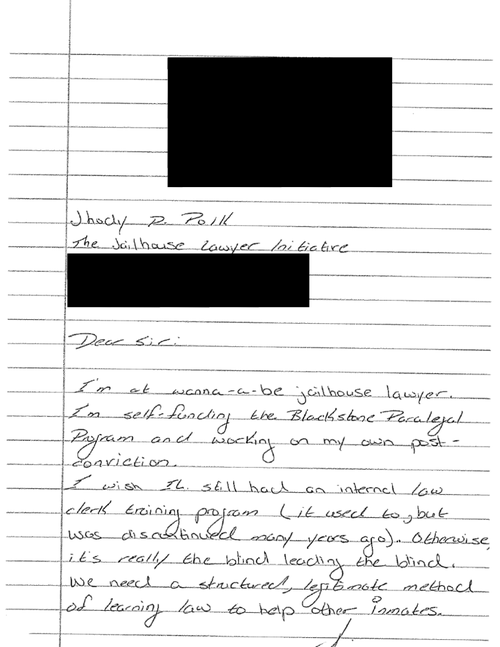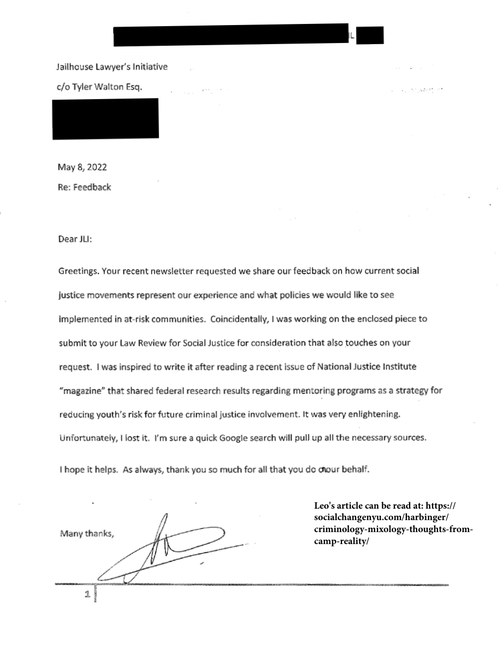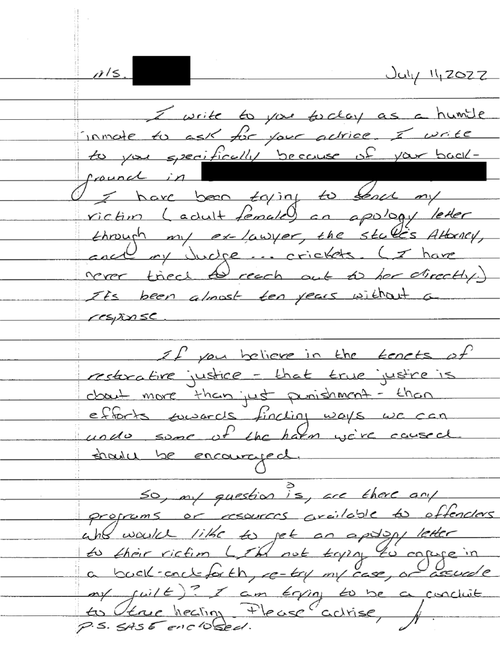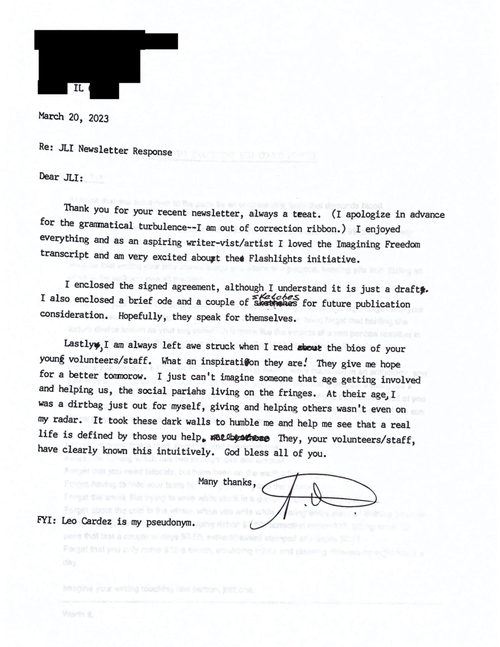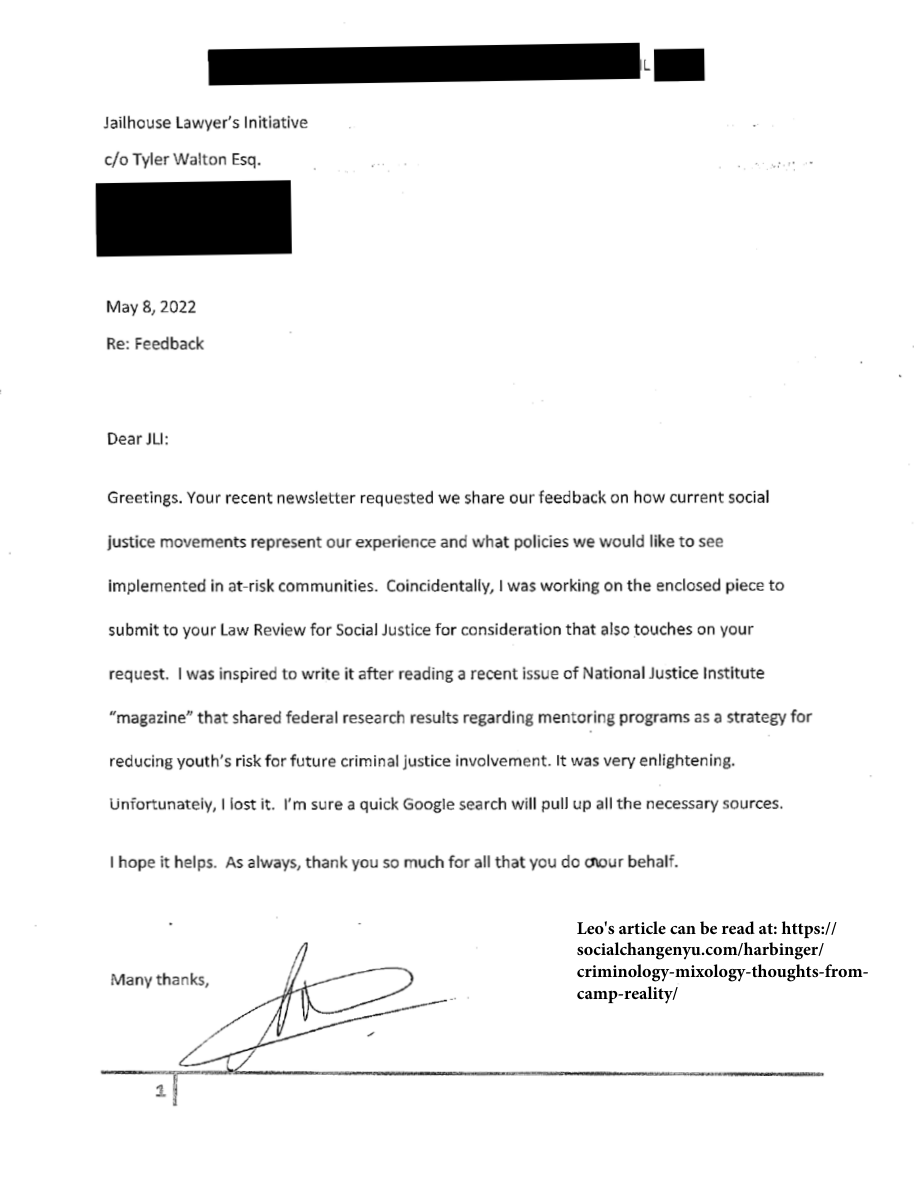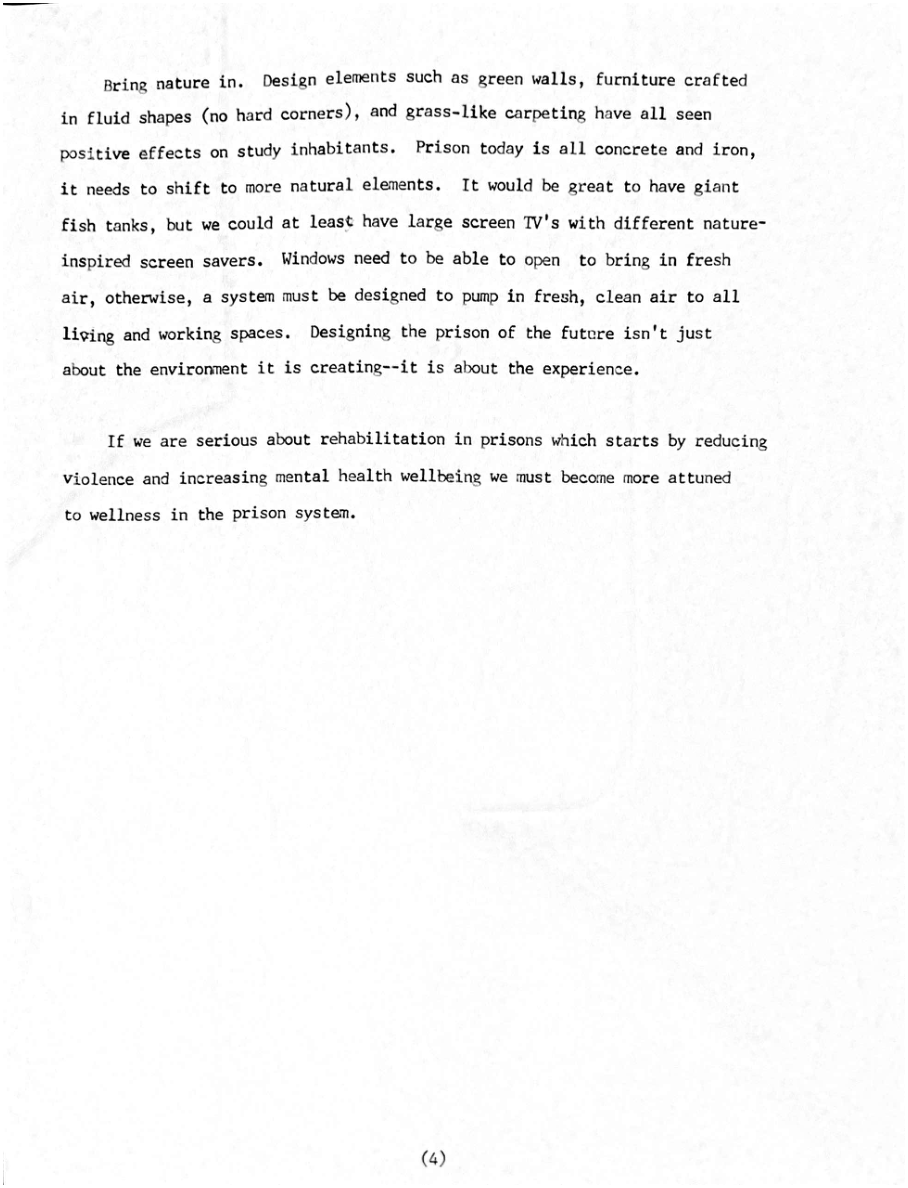Leo Cardez
I wish the world could read this letter so that they could know this:- Sleep deprivation
- Addressing class inequities
- Organizing
- Advocacy
- Withholding mail access and oppressive communication policies
- Language Barriers
- Legal work from the inside
- Care Work
- Addressing Innocent/wrongful conviction claims
- Being met with silence by organizations
- Mental health care
- Medical neglect
- Excessive heat
- Addressing Sexual Violence
- Lack of outside recreation
- Retaliation/abuse of the disciplinary system
- Seeking a bridge/advocate between inside/out
- Price gouging
- Corruption in the trial process
- Inadequate law libraries and legal resources
Leo Cardez
transcription
Jhody P. Polk
The Jailhouse Lawyer Initiative
[REDACTED]
[REDACTED]
Dear Sir:
I'm at wanna-a- be jailhouse lawyer.
I'm self-funding the Blackstone Paralegal
Program and work on my own post-
conviction.
I wish IL. still had an internal law
check training program (it used to, but
was discontinued many years ago). Otherwise,
it's really the blind leading the blind.
We need a structured, legitimate method
of learning law to help other inmates.
L
Leo Cardez
transcription
[REDACTED] IL [REDACTED]
Jailhouse Lawyer's Initiative
c/o Tyler Walton Esq.
[REDACTED]
[REDACTED]
May 8, 2022
Re: Feedback
Dear JLI:
Greetings. Your recent newsletter requested we share our feedback on how current social
justice movements represent our experience and what policies we would like to see
implemented in at-risk communities. Coincidentally, I was working on the enclosed piece to
submit to your Law Review for Social Justice for consideration that also touches on your
request. I was inspired to write it after reading a recent issue of National Justice Institute
"magazine" that shared federal research results regarding mentoring programs as a strategy for
reducing youth's risk for future criminal justice involvement. It was very enlightening.
Unfortunately, I lost it. I'm sure a quick Google search will pull up all the necessary sources.
I hope it helps. As always, thank you so much for all that you do on our behalf.
Many thanks,
[SIGNATURE]
[ADDED BY JLI: Leo's article can be read at: https://socialchangenyu.com/harbinger/criminology-mixology-thoughts-from-camp-reality/]
Leo Cardez
transcription
Ms. [REDACTED] - July 11,2022
I write to you today as a humble
inmate to ask for your advice. I write
to you specifically because of your back-
ground in [Redacted]
I have been trying to send my
victim (adult female) an apology letter
through my ex-lawyer, the state's Attorney,
and my Judge ... crickets. (I have
never tried to reach out to her directly.)
It's been almost ten years without a
response.
If you believe in the tenets of
restorative justice - that true justice is
about more than just punishment - than
efforts towards finding ways we can
undo some of the harm we've caused
should be encouraged.
So, my question is, are there any
programs or resources available to offenders
who would like to get an apology letter
to their victim (I'm not trying to engage in
a back-and-forth, re-try my case, or assuade
my guilt)? I am trying to be a conduit
to true healing. Please advise, L
P.S. SASE enclosed.
Leo Cardez
transcription
[REDACTED]
[REDACTED]
[REDACTED]
[REDACTED] IL [REDACTED]
March 20, 2023
Re: JLI Newsletter Response
Dear JLI:
Thank you for your recent newsletter, always a teeat. (I apologize in advance
for the grammatical turbulence--I am out of correction ribbon.) I enjoyed
everything and as an aspiring writer-vist/artist I loved the Imagining Freedom
transcript and am very excited about the Flashlights initiative.
I enclosed the signed agreement, although I understand it is just a draft.
I also enclosed a brief ode and a couple of sketches for future publication
consideration. Hopefully, they speak for themselves.
Lastly, I am always left awe struck when I read the bios of your
young volunteers/staff. What an inspiration they are! They give me hope
for a better tommorow. I just can't imagine someone that age getting involved
and helping us, the social pariahs living on the fringes. At their age, I
was a dirtbag just out for myself, giving and helping others wasn't even on
my radar. It took these dark walls to humble me and help me see that a real
life is defined by those you help. They, your volunteers/staff,
have clearly known this intuitively. God bless all of you.
Many thanks,
[SIGNATURE]
FYI: Leo Cardez is my pseudonym.
AN ODE TO IMAGINING YOU COULD FORGET
By Leo Cardez
Imagine that you are driven to the page by an unspeakable force that demands blood.
Forget that you have been deemed sub-human and are warehoused on the fringes of society
without access to computers, copiers, or the internet.
Imagine that writing your little stories brings you peace and purpose, keeping you from falling so
deep in the well you lose all the light.
Forget that your hard steel stool causes you to lose feeling in your butt and legs; forget that your
low table causes neck aches that will lock up your back after an hour; forget that holding the
torture device known as your seg penwhich is more like the innards of a real penhas resulted in
you being diagnosed with carpel tunnel, requiring steroid shots to alleviate the pain.
Imagine that you won a PEN America Prison Writing Award, were published In an anthology, saw
your play produced as a puppet show, received a small financial award, and were assigned a
mentor (shoutout to [REDACTED]). Imagine that your family wrote to tell you they were proud of you
for an article you had published in their favorite Christian magazine. Imagine feeling as if the sun
shone on you from all sides. Now, imagine It happened again.
Forget the noise that is loud, constant, and overwhelming.
Forget the lighting which has two settings: dim and dimmer.
Forget that you need bifocals, but have been on the waitlist for two years.
Forget having to hide your tears by quickly jumping into the shower.
Forget the smell, like trying to write while stuck in a dumpster during a heat wave.
Forget about the cold in the winter, when you write while wearing every piece of clothing you own.
Forget that typewriters cost $400, typing ribbon $7.50, correction ribbon $17, typing paper $2,
pens that last a couple of days $0.50, self-addressed stamped envelopes $0.71.
Forget that you only make $15 a month, scrubbing toilets and cleaning showers for eight hours a day.
Imagine your writing touching one person, Just one.
Worth it.
CONVICT CRIMINALS: caged america by Leo Cardez
[ARTWORK]
CONVICT CHRONICLES:
leo cardez
[ARTWORK]
Leo Cardez
transcription
Dear JLI
I write to you today to follow-up on my September 2021 letter. I understand you must be extremely busy, but I am hoping you may be able to respond this time
My questions:
1) Info on how to organize a JLI committee at my prison
2) Info/ guidelines/application for Blackstone Para legal course sponsorship.
3) Recent zine, to be added to subscription list.
4) Enclosed essays for consideration to be posted on Behind the Wall.
Please accept my apologies for having to use the antiquated snail mail system. As an individual in custody, left voiceless on the fringes of society, I lack internet access. Also, as an indigent inmate, I humbly request an extreme hardship waiver of any fees or costs.
I am an award-winning inmate writer and Pushcart Press Prize and Best Essays in America- nominated essayist and journalist. As a winner of the prestigious PEN America Drama/Play Award I was published in a print anthology earlier this year, PRISON BLUES. My work has been or is scheduled to be published in Under the Sun, The Abolitionist/Critical Resistance, The Crime Report, N.A.R.S.O.L. & College Guild newsletters, Minutes Before Six, Poete Maudit Literary Review, Yard Out, Prison Journalism Project, Prisoner Express, American Prison Writing Archive, Beat Within, Two Roads, Breakthrough Magazine, Fortune News among others. Additionally, I was a finalist for the New Press anthology, What We Know. I am a regular contributor to Prison Health News where I also serve on the Advisory Board. I have worked as a prison GED tutor, COVID-19 quarantine wing sanitation specialist, and currently work as a clerk at the prison eye lab. I volunteer as a yoga instructor for special needs inmates and translator for Spanish speaking offenders. As a decorated veteran and devout Christian I am passionate about using my voice to bring awareness of social justice and mental health issues in prisons.
Thank you in advance for your time and consideration. You can reach me at the address above or at [email protected] (Pen name: Leo Cardez). I look forward to your prompt response.
submissions:
1. Criminology mixology wart Many thanks, 2. Building a Better Prison
CRIMINALITY COCKTAILS
HOMEMADE CRIMINAL
2 pt. VIOLENCE
1pt. POVERTY
1 dash of BROKEN HOME
Allow to Simmer
Trauma, Violence, Mentorship, Broken Home Quality Education, Healthy Home, Community Support, Poverty
By: Leo Cardez
BUILDING A BETTER PRISON
The American prison industrial complex is another example of being "too big to fail." Trust me, I hate it as much as the next guy; probably more than the next guy since I am rotting away at one of America's finest gray bar human warehouses. When I arrived to prison about seven years ago there was talk about reducing prison populations and closing prisons. Since then, at least three new prisons have opened in my state. Now, I have to give the spin doctors their due: They are not new prisons, they are a new mental health facility and two new re-entry facilities. The reality is they took some abandoned buildings threw a coat of paint on them, moved around some furniture and Presto. But like my Grandpa used to say, Don't piss on my leg and tell me it's raining. They age all 100% prisons and have increased the bed capacity statewide by over a thousand -- that means the status quo can now house one thousand more inmates then it could ... and they did (there's a waitlist for each of these new facilities).
If you can't beat 'em ...
If we as a society have agreed that we want to continue to incarcerate our population at a percentage that dwarfs any other first-world nation, so be it. But the least we can do is a build a better, more humane, prison. There's a lot to be said about the need for better education and programming; safer, cleaner environs; mental health services; healthier food options; and the list goes on, but for this piece I want to focus on something much simpler and less controversial to implement: Architecture and Design.
Prisons built or re-designed with wellness-focused architecture and design can make indoor spaces healthier, safer, and transform the way inmates serve their sentences.
We spend 90 percent of our time indoors (at an absolute minimum) -- much of that in our cell -- and what we are exposed to impacts our health in ways we might not even be aware of. Lighting can disrupt sleep, air pollutants can cause respiratory issues, and noise can increase stress hormone levels. But it doesn't have to be this way.
The vast majority of inmates are not getting enough sleep, and electric light might be a culprit (shoddy fluorescent count check lights and overly bright hallway lighting, etc.). It disrupts our natural circadian rhythm, as it is too dim for daylight and too bright for night. Circadian lighting design is an innovative solution.
This type of transitional lighting already exists and can be added to existing; lighting fixtures with the ease of an app. This would allow the color of light inside to change throughout the day. In the morning, the light has a warm glow that slowly transitions to a cool temperature until the afternoon, when it begins transitioning back to warm.
Natural daylight is still the truest form of circadian light, so prison designers should still strive to enhance it. Things like semi-transparent blinds that block glare without reducing natural light and day rooms placed near windows to maximize daylight and views are easy fixes.
Loud spaces tend to impact concentration and productivity, but long-term exposure to even low-level background noise can raise stress hormone levels. New prisons might create quiet spaces, install phone booths for private conversations, use white noise machines to provide an underlying hum, and integrate sound- absorbent materials.
Some industrial carpets can act like a sponge for ambient sound, and it can also prevent movement across the floor from creating excessive noise. In spaces with multiple floors, carpet also helps prevent the transmission of noise between cells below and above.
But this new lighting and sound features would not just benefit the inmate population but could (and should) be used in all working areas including offices, classrooms, or anywhere else there are officers, volunteers, and administration workers. Mental and emotional health are essential to employees' well-being. And as every inmate knows, A happy guard means a happy shift.
Another design aspect to increase overall well-being is Biophilic design- that is, design that connects people with nature -- it is an innovative way to reduce stress and enhance creativity, clarity of thought, and happiness.
Bring nature in. Design elements such as green walls, furniture crafted in fluid shapes (no hard corners), and grass-like carpeting have all seen positive effects on study inhabitants. Prison today is all concrete and iron, it needs to shift to more natural elements. It would be great to have giant fish tanks, but we could at least have large screen TV's with different nature- inspired screen savers. Windows need to be able to open to bring in fresh air, otherwise, a system must be designed to pump in fresh, clean air to all living and working spaces. Designing the prison of the future isn't just about the environment it is creating -- it is about the experience.
If we are serious about rehabilitation in prisons which starts by reducing violence and increasing mental health wellbeing we must become more attuned to wellness in the prison system.
Leo Cardez (pen name) Bio:
Leo Cardez is an award-winning inmate writer. Cardez is a Pushcart Press Prize and Best American Essays-nominated essayist and journalist. Mr. Cardez is a winner of the prestigious PEN America Award and was published in a print anthology earlier this year: Prison Blues. His work has been or is scheduled to be published in The Evening Review, The Harbinger (NYU Review of Law and Social Change), and Spotlight on Recovery magazine, Under the Sun online zine, The Abolitionist/Critical Resistance newspaper, The Crime Report online publication, Minutes Before Six online zine, Prison Journalism Project, Beat Within, Fortune News, Breakthrough Magazine among others. He was a finalist for the New Press anthology, What We Know. Leo is a regular contributor to Prison Health News where he also serves on the Advisory Board. L.C. has worked as a prison GED tutor, COVID-19 quarantine wing sanitation specialist, and currently works as a clerk at the prison eye lab. He volunteers as a yoga instructor for special needs inmates and translator for Spanish-speaking offenders. Mr. Cardez is a proud first-generation Hispanic, decorated veteran, devout Christian, and is passionate about using his voice to bring awareness of criminal justice and mental health/addiction issues. He can be reached at [email protected].
** The many reasons I ended up in prison are too personal and sad to share here. Much of it has to do with my demons, addictions, and mental health history, but a good portion of trouble was related to inexcusable actions. I don't think it is necessary or appropriate for me to discuss those issues in my bio out of respect for my victim, their family, and my own. Nor would I ask anyone to believe that I am capable of reporting an unbiased version of the story, and therefore, the chronicle of my imprisonment will remain untold here.
